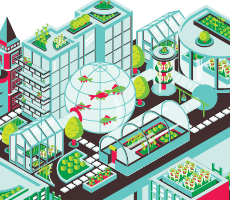Nothing Fishy Here
A Microgreens Vertical Farm Grows in Brooklyn

Illustration by Jason Kesiling
Illustration by Jason Kesiling
Most people don’t get off at the Montrose Avenue subway station in Bushwick, Brooklyn, to visit a farm. To buy a doughnut? Sure. Coffee? Not a problem.
But a block from the subway, in a parking lot surrounded by a metal fence, stands an industrial building. Through the doorway and up three flights of stairs is Edenworks, a rooftop vertical farm using fish to harvest microgreens.
Founded in 2013 by Jason Green ’11 with two partners, Edenworks raises tilapia on site and, through a farming process known as aquaponics, turns their waste into fertilizer to nourish the young versions of vegetables like broccoli, kale, radish and mustard greens. At Edenworks, the greens float in raft-like beds in about three inches of water and are stacked on four shelf-like growing surfaces, putting the “vertical” in “vertical farm.”
Even though Green seems perfectly cast for the role of Brooklyn urban farmer—beard, glasses, wardrobe heavy on black—he started with a different career plan. As an undergraduate, the biology major worked in Professor Emeritus John Jeka’s lab on virtual reality applications for neurological rehabilitation. Recognized as the 2011 Undergraduate Researcher of the Year and a Howard Hughes Medical Institute Research Fellow, Green expected to pursue joint medical and doctoral degrees.
CHANGING HOW MICROGREENS ARE GROWN AND DISTRIBUTED, GREEN BELIEVES, CAN HAVE A MACRO IMPACT.
The New York native was working in a lab at the Albert Einstein College of Medicine after graduating from the University of Maryland when he realized that “academia was not where I was going to feel fulfilled,” he says. “Rather than writing a paper, I wanted to get something impactful into the user’s hands.”
Green took some time to explore “what the big impact areas were going to be over the course of my lifetime. Food seemed to be at the nexus of a lot of global issues.”
Beyond the science and health aspects of food, its more personal elements appealed to Green. “You eat food every day and brush your teeth every day,” he says. “You have a very different relationship with eating than you do with brushing your teeth. It’s not purely habit.”
Green’s mission to bring to the masses sustainably raised, local, “more delicious” fresh food found fruition in 2013, when he took his idea for an urban aquaponic farm to pitch events for entrepreneurs and found both his eventual co-founder Matt La Rosa and funding for what became Edenworks. (The third co-founder, Ben Silverman, came on later the same year.)
Inside Edenworks’ 800-square-foot Farmlab, tilapia swim in two round tanks.
Using equipment filled with beneficial bacteria, Edenworks converts waste from the fish into organic fertilizer, a process Green compares to brewing beer. Fertilized water is then pumped into the growing beds. Further sustained by LED lights, the greens grow and ready for harvest in seven to 10 days. The fish grow until they weigh about 1 to 1.5 pounds, then are donated to local organizations or served at company events.
Edenworks, which has raised $3 million in venture capital funding, now has 10 full-time employees and two ready-to-eat salad lines available for purchase at Brooklyn Whole Foods Market locations—one, called “Mighty Microgreens,” contains a mix of broccoli, red cabbage and red Russian kale, while the second, “Spicy Microgreens,” lives up to its name by combining radish, red cabbage and mustard greens.
Green is planning on expanding: Edenworks hopes to open a 12,000-square-foot farm in Brooklyn soon, which, in addition to greens, will also make its fish commercially available. Green has his sights set on locations beyond New York. “Ninety-five percent of America’s leafy greens are grown in California and Arizona and then spend a week in transit,” he says. By expanding to set up farms across the country that serve the region in which they’re located, Edenworks hopes to become a local alternative for national grocers.
Changing how microgreens are grown and distributed, Green believes, can have a macro impact. “As a New Yorker, I’m not going to change the way corn, soy, wheat or beef are grown,” says Green. “But fresh food is a really fascinating problem.”